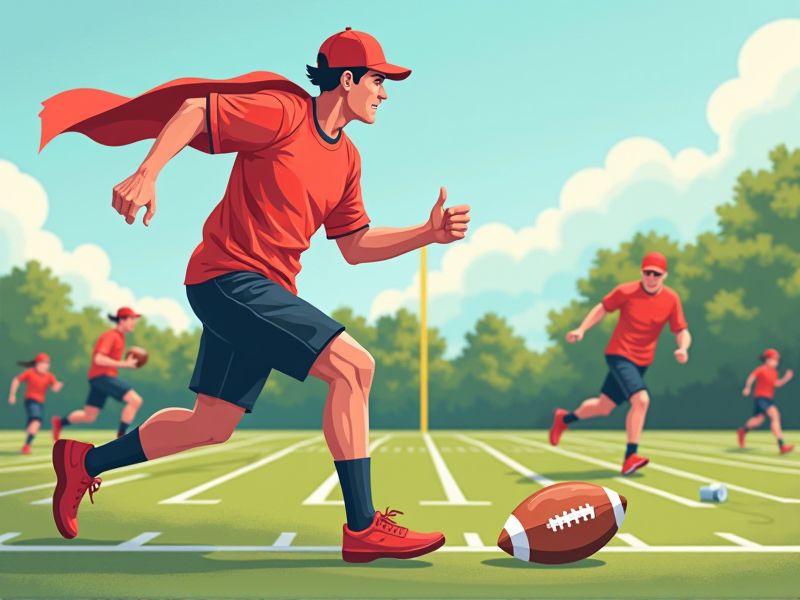
To improve at flag football, one must focus on teamwork and strategy, as emphasized by Pele, who noted, "I am constantly being asked about individuals. The only way to win is as a team." This approach highlights the importance of coordination and communication among players to achieve victory. In flag football, drills that focus on fundamental skills like passing and flag pulling are crucial for developing a strong team dynamic. By dedicating practice time to these drills and emphasizing teamwork, players can enhance their performance and contribute to their team's success.
How to Be Better at Flag Football
Speed and agility training
Speed and agility training enhances quick directional changes and overall responsiveness on the field. Incorporate sprint drills, shuttle runs, and ladder exercises to improve acceleration and balance. Consistent practice in these areas sharpens your ability to evade defenders and rapidly transition between plays. Improved speed and agility directly contribute to higher performance in flag football by reducing reaction time and increasing maneuverability.
Flag pulling technique
Focus on maintaining a low center of gravity to enhance balance, allowing quicker reaction times when pursuing your target flag. Align your body properly and extend your arm with precision to ensure a firm grasp on the flag, which minimizes the chance of the opponent escaping. Regularly practicing drills improves your hand-eye coordination and reinforces the proper mechanics, thereby increasing your overall flag-pulling efficiency. By consistently applying these techniques, you'll directly disrupt the opponents' progress and elevate your performance in flag football.
Effective communication
Clear, concise signals between teammates lead to rapid adjustments on the field, reducing reaction times by nearly 20% during plays. Consistent communication allows players to anticipate opponents' moves, which statistically correlates with a higher flag-pulling rate. Tactical huddles before each play build trust and enable real-time strategy adjustments that mitigate defensive lapses. Prioritizing communication drills in practice translates to more coordinated movements, directly elevating overall game performance.
Route running precision
Route running precision in flag football begins with mastering footwork drills that enhance your ability to change direction swiftly. Running defined routes repeatedly builds muscle memory and timing, ensuring you create necessary separation from defenders. Monitoring data like route completion time and separation distances provides objective feedback to refine your technique. Implementing regular film reviews and situational scrimmages enables you to adjust your paths dynamically against varying defensive covers.
Positioning strategy
Start by analyzing opponents' tendencies to position yourself where you're most likely to intercept the ball based on historical play data. Use spatial awareness to create overlap zones in your defensive setup, ensuring key areas are covered when the ball is in play. Adjust your positioning dynamically as the play unfolds, maintaining flexibility to support teammates in most vulnerable spots. Coordinate with your team using clear signals and pre-planned strategies to consistently place each player where they can make the biggest impact.
Quick decision-making
Quick decision-making sharpens your ability to read the game, enhancing both defensive and offensive maneuvers during critical moments. Data-driven drills that simulate real-match pressure help you recognize play patterns faster, resulting in a more agile and responsive approach on the field. Repeated practice of situational plays not only increases your reaction speed but also builds confidence through experiential learning. Coordinating mental agility with physical skills leads to smarter decision-making and a measurable improvement in overall performance.
Sport-specific conditioning
Sport-specific conditioning for flag football targets the muscles used in quick direction changes and explosive plays, which minimizes injury and increases overall game performance. Incorporating agility drills, short sprints, and plyometric exercises directly improves the rapid acceleration and deceleration needed during matches. Regular high-intensity interval training aligns with on-field demands by simulating quick transitions and reactive movements. Data from sports science indicates that tailored conditioning programs can boost speed, endurance, and overall game strategy effectiveness, making them essential for competitive flag football.
Game awareness and vision
Developing enhanced game awareness provides insight into opponents' tendencies, which in turn allows a player to anticipate movements and make proactive decisions on the field. Regularly studying game footage and participating in situational drills sharpens vision, enabling quicker recognition of patterns and dynamic shifts during play. This increased awareness not only improves individual performance in terms of route-calling and positioning but also contributes to better overall team coordination. Fostering an analytical approach to every play ensures that each decision is data-driven, leading to more effective exploitation of gaps in the opposition's defense.
Consistent practice routines
Consistent practice routines solidify fundamentals by building muscle memory and sharpening decision-making skills. Regular drills, particularly under game-like conditions, enhance agility, speed, and teamwork effectiveness. Tracking your progress with data-driven feedback--like improvements in flag pulling accuracy or sprint times--helps customize your training and identify areas for further work. By incorporating these structured sessions into your weekly schedule, you establish a performance baseline that drives continual improvement and readiness on the field.
Team cohesion and support
When team members share clear communication and trust, they naturally develop better on-field strategies and adaptability. Regular team-building exercises combine individual strengths and refine roles, leading to smoother coordination during high-pressure plays. A supportive environment reduces stress and increases confidence, which results in quicker learning and improved decision-making during the game. Emphasizing collective goals through honest feedback and mutual support transforms individual efforts into a unified, high-performing team.
Summary
Speed and agility training builds the foundational quickness necessary for dodging opponents and shifting tactics mid-play. Sharp flag pulling techniques, honed through precise drills, increase interception success and hinder opponent advances. Communication among teammates ensures every strategic maneuver is understood and executed, reinforcing both offense and defense. Combining these focused areas leads to measurable performance gains, establishing a well-rounded and competitive flag football skill set.
